From Career to Legacy: Six Olympic Legends & Where They Are Now
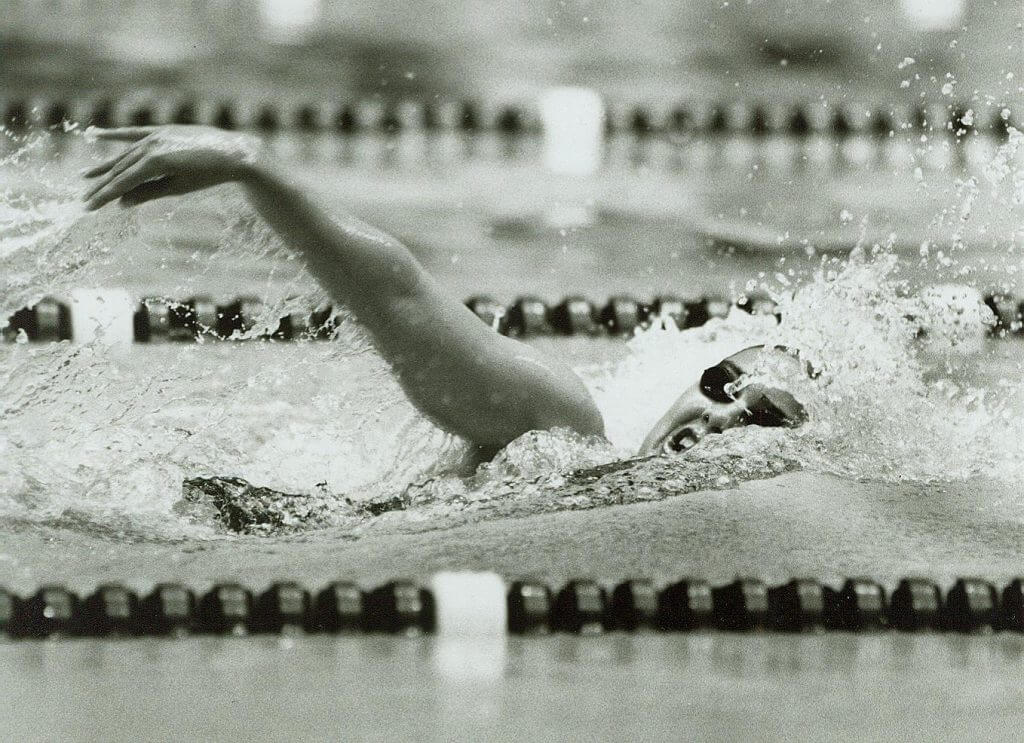
By Kaylie Williams, Swimming World College Intern.
A teammate will remember your personality, achievements, work ethic, and – if you’re lucky enough to have one – a legacy. But what will you choose to do after your career is over? Will you continue that legacy to give back to the sport that gave you so much? These six Olympic swimming legends did all of the above. Keep reading to see where they are now!
Mark Spitz, Age 69
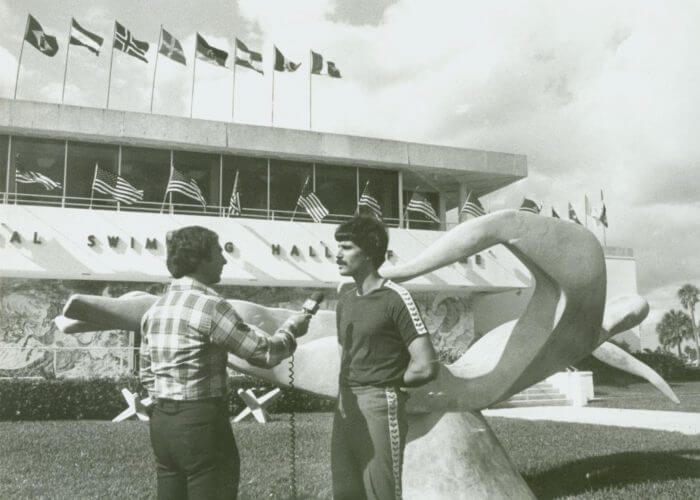
Photo Courtesy: International Swimming Hall Of Fame (Spitz in front of ISHOF)
Mark Spitz is often revered as one of the greatest swimmers of all time. He exhibits the drive and determination to succeed that all true Olympic athletes have in their hearts. After under-performing in his individual events during the 1968 Mexico City Olympic Games, Spitz decided to come back to the 1972 Munich Games better and faster than before. He entered seven events, breaking each record and winning gold in every race. He became well known for his performance at the 1972 Olympics and held the record for most consecutive gold medal wins in any single Olympic Games for 36 years! In 2008, Spitz’s popularity resurged as Michael Phelps broke his long-standing record and captured eight gold medals in the Beijing Olympics.
Spitz spent a few years post-competition covering swimming events for ABC sports, working as a real estate agent and doing promotional work on TV. Today, he still participates in some promotional work, but he spends most of his time traveling all over the world as an entrepreneur and motivational speaker.
Pablo Morales, Age 54
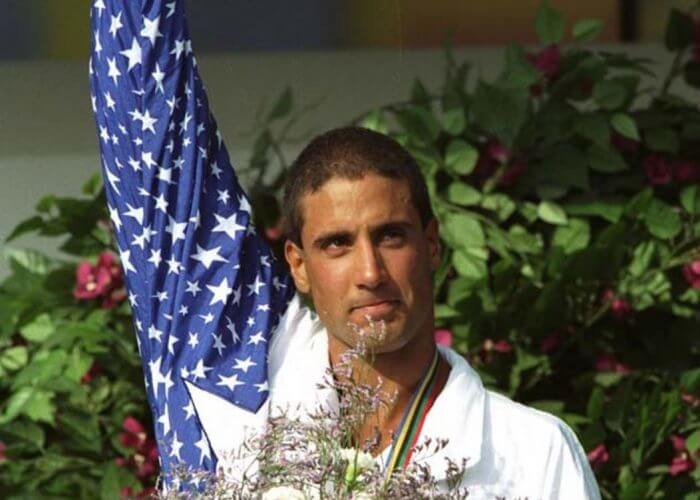
Photo Courtesy: Bob Martin/Allsport (Morales on podium 1992)
Known as the “comeback kid” of elite swimming, Pablo Morales is often recognized for his outstanding performance in the 1992 Barcelona Olympic Games. There was no doubt that Morales was a force to be reckoned with in the men’s fly events. In the 1984 Los Angeles Olympics, Morales collected three gold medals. Later in 1986, he established a world record for the 100 fly which stood for nine years. After failing to qualify for the 1988 Seoul Olympics, Morales took a four-year break from swimming to pursue a law degree. Little did his competitors know, Morales would be back in the water in 1992 not only to qualify for the Barcelona Games but also to eventually take first in the 100 fly. With this win, he became the oldest gold medal winner in his event at the age of 28.
After his outstanding competitive career and his performance at the 1992 Barcelona Games, Morales was honored and voted Sportsman of the Year by the United States Olympic Committee. He then decided to pursue a career in coaching, eventually becoming the head coach of the Masters program at Stanford from 1988-89 as well as the head coach of women’s swimming program at San Jose State University from 1998-2001. Today, you can find Morales in his seventeenth season as head coach for the Nebraska Huskers Swimming and Diving program at University of Nebraska.
Rowdy Gaines, Age 60
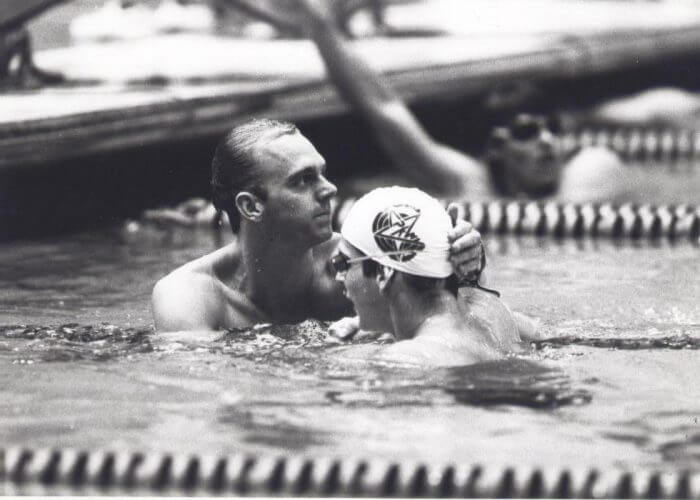
Photo Courtesy: International Swimming Hall of Fame (Gaines at meet)
Rowdy Gaines made a name for himself at the 1984 Los Angeles Olympic Games when he helped lead the United States Swimming team to new records in the 400 free and 400 medley relays as well as breaking his personal record in the 100 free. In the 1984 Olympics, he secured three gold medals, winning more races and medals than any swimmer in the competition. Gaines was responsible for setting ten world records throughout his decorated career, which eventually earned him a place in the International Swimming Hall of Fame and the United States Olympic Hall of Fame.
If you watch swimming events on TV, chances are you’re listening to Gaines’ voice as the commentator. Gaines has covered swimming at every Olympics since 1996 and has been known to call the most important races in swimming history. Today, he still works as a sportscaster and swimming analyst for ESPN and NBC swimming and is the biggest fundraiser and supporter for USA Swimming.
Shirley Babashoff, Age 62
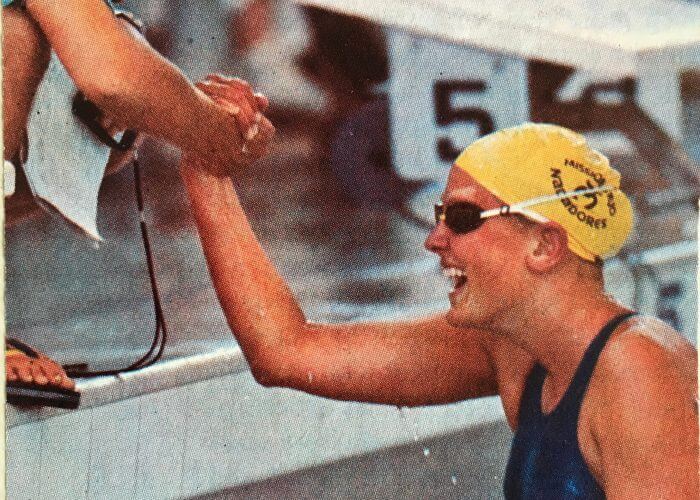
Photo Courtesy: International Swimming Hall of Fame (Babashoff and Mark Schubert)
Shirley Babashoff is well known for her successes at the 1972 Munich and 1976 Montreal Olympic Games. Babashoff never won an individual gold, but she anchored her relay teams to several golds and established five world records on various relay teams. She went on to acquire eight Olympic medals and set six world records of her own. Similar to Spitz’s record, Babashoff set a new record for women when she collected five medals in a single Olympic Game in 1976. Following her successful career, Babashoff was inducted into the International Swimming Hall of Fame in 1982 and the U.S. Olympic Hall of Fame in 1987.
After her competitive career ended, Babashoff began writing a book entitled Making Waves: My Journey to Winning Olympic Gold and Defeating the East German Doping Program, which focuses on her and her American teammates struggles to defeat the East Germans due to unregulated doping during the Olympics. Feeling cheated of “peak moments” and unrevised record books, Babashoff and other American swimmers also worked on a film named The Last Gold that also brings awareness to the systematic sports-doping habits of the Russian athletic programs. Today, Babashoff works as a mail courier for the USPS in Southern California.
Donna de Varona, Age 71
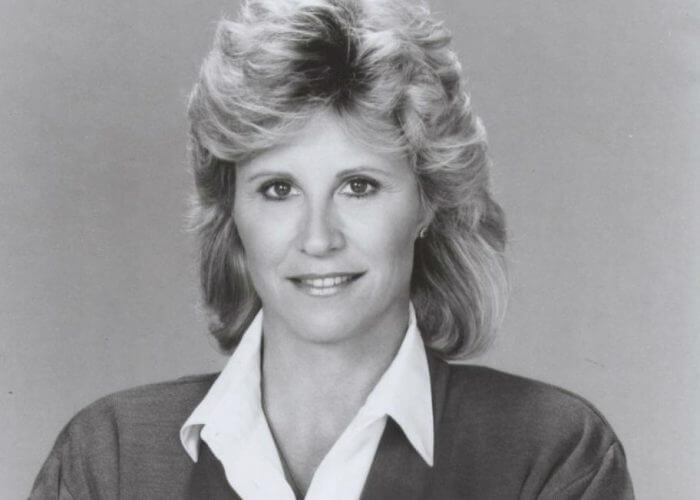
Photo Courtesy: International Swimming Hall of Fame (DeVarona as a reporter for ABC)
Donna de Varona made a name for herself as the youngest swimmer to join United States Olympic Swim Team in 1960 at the age of 13! Four years later in Tokyo, she made quite a splash when she broke 18 world swimming records and collected two gold medals for the 400 IM and 400 free relay. After her performance in the 1964 Olympics, she was voted Most Outstanding Female Athlete in the World by both Associated Press (AP) and the United Press. Because of her accomplishments at such a young age, DeVarona is perhaps one of the swimming world’s most recognized athletes.
After her competitive swimming career came to an end, de Varona set more records as she became the youngest and first female sportscaster on TV. In 1965, her broadcasting career began when she started working for ABC covering events in the sports broadcasting field. Later, she would become the first woman to cover the Olympic Games on TV! Today, de Varona continues to break barriers for women as an activist and pioneer by paving “the way for the future women athletes and journalists alike.”
Janet Evans, Age 47
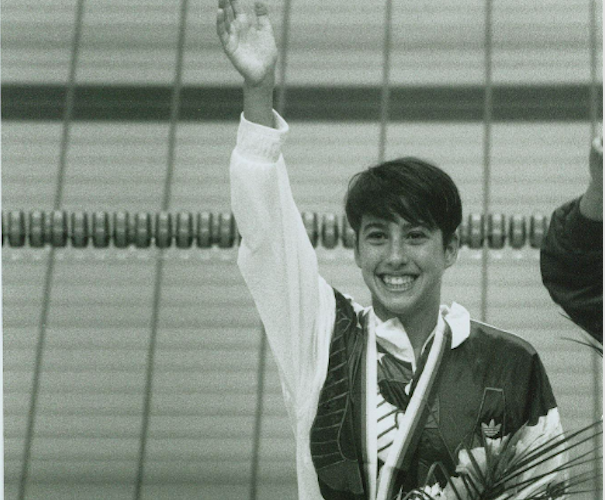
Photo Courtesy: International Swimming Hall of Fame (Evans on the podium in Seoul, 1988)
Before the age of Katie Ledecky, Janet Evans was arguably the best female distance swimmer in history. At age 15, Evans rose to the top, breaking records in the 400, 800 and 1500 free events. She was recognized for her strange stroke and small stature, which worked to her advantage: she ended up winning 25 out of 27 major international races in the 400 free and 22 out of 23 races in the 800 free between 1986 and 1995. Her world record for the 800m freestyle was a longstanding one, lasting through four Olympic Games until it was finally broken at the 2008 Beijing Games by Rebecca Adlington.
Because of her outstanding career, Evans has been inducted into the International Swimming Hall of Fame and recognized as Swimmer of the Year by the United States Olympic Committee as well as many other swimming agencies. Today, Evans keeps herself quite busy as a motivational speaker and an ambassador for LYFE Kitchen, a restaurant chain that promotes healthy eating from local food sources. She also authored the book Janet Evans’ Total Swimming.
All six of these extraordinary athletes continued to give back to the sport and swimming community that gave them so much during their competitive career. Their legacies and achievements continue to inspire new generations of athletes even today after they have left the spotlight.
After your competitive career is over, what will you give back to the swimming community?
-All commentaries are the opinion of the author and do not necessarily reflect the views of Swimming World Magazine nor its staff.




A smile at every name
Akiane
Wish Kornelia and Shirley would race as master’s swimmers
Love Rowdy. Far and away the best swimming analyst I’ve ever heard. Always has great insight into events and is able to articulate how swimmers think and describe their strategies. And even at 60 he gets so excited, like a teenager watching great swims. ???
Love this article like to see it on Australia France Hungary UK Spain China Netherlands etc
Just the very best!!!!
Pablo Morales was my favorite swimmer when I was a kid. But in 1984 he won a gold and 2 silvers, not 3 golds like the article says.